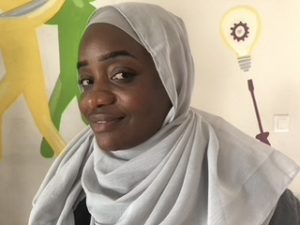In West Africa, the Réseau Bretagne Solidaire (RBS) project supports the development of 11 Fablabs. These new-style workshops hold the promise of inclusive production for many types of equipment, including medical equipment. Who are these Fablabs, what do they do and what are their resources and objectives? Meet the team of the Xam Xam Fablab in Senegal.
An activity developed during the Covid crisis
The Fablab is in Rufisque, a small town of about 150,000 inhabitants located about 30 kilometres from Dakar. The Xam Xam laboratory, which means “knowledge” in Wolof, is located on the premises of the Senegalese scouts. A large room houses fairly recent computer equipment, pending new equipment provided by the RBS project of the DIRECCT programme.
MBakhane Diop, the director of the FabLab, welcomes us and explains: “We created this Fabalb during the Covid period, and then we immediately set up training courses”. El Hadji Daouda Diagne, the Fab manager, adds: “When we receive the equipment, the laser cutter and the silk-screen printing machine that the RBS and DIRECCT project will provide, we will work on health. We have already met with an association of disabled people who have problems with their prostheses and we will be able to help them. We are also going to work on prototypes and on equipment that hospitals need”. Ultimately, this new equipment will provide a local response to health problems, thus strengthening the resilience of the population. And to get to that stage, training is an absolutely essential component.
Here, El Hadji Daouda Diagne presents the Fablab equipment:
Training at the heart of the Fablab.
MBakhane Diop: “Here, we welcome everyone, people of all ages, all origins, without discrimination. We have already trained about a hundred people”.
The training is adapted to the type of public and is designed according to the learners’ knowledge and abilities. These courses range from learning how to use a computer for the first time to, for the more experienced, the maintenance of digital tools.
Here, El Hadji Daouda Diagne, describes the training provided by Xam Xam:

Making a logo with a 3D printer:
What sustainability?
The question of economic sustainability is central to the viability of these Fablabs. Like other laboratories of this new kind, Xam Xam benefited from donations and financial and technical support to create the workshop and acquire equipment. But then, on what funds and what economic model will the Fablabs continue their activities? For the director of Xam Xam, the workshop cannot directly create jobs, but it makes the equipment available to the learners so that they themselves can try to develop their own activities, with the aim of transferring part of the profits to the workshop.
Here, MBakhane Diop, director of the centre, explains the strategy of the Fablab:
Looking for new markets
The two new machines that the Fablab will receive will enable them to develop their activity. But, beyond its technical capacities, the workshop also needs to make itself known, as this type of service is still in its infancy and not very well known. The Xam Xam team is developing the workshop’s visibility, in particular by organising regular open days to show the capacities and possibilities offered by the Fablab. The Fablab must therefore open up to new customers and be able to supply quality parts. “Today, the local mechanic does not yet know that he can come here to have parts made. Most car parts are made of plastic today and no craftsman is capable of building a plastic part with very precise and fine dimensions. We can do it with 3D printers. We can make it in 4 or 5 hours, which is better for him than spending 4 or 5 days looking for a part that he may never find”, explains El Hadji Daouda Diagne, the Fab manager.
Potentially, the workshop can provide very competitive services and thus enable young men and women to develop an independent economic activity. At the same time, it will be able to provide low-cost, locally designed and manufactured medical equipment.
